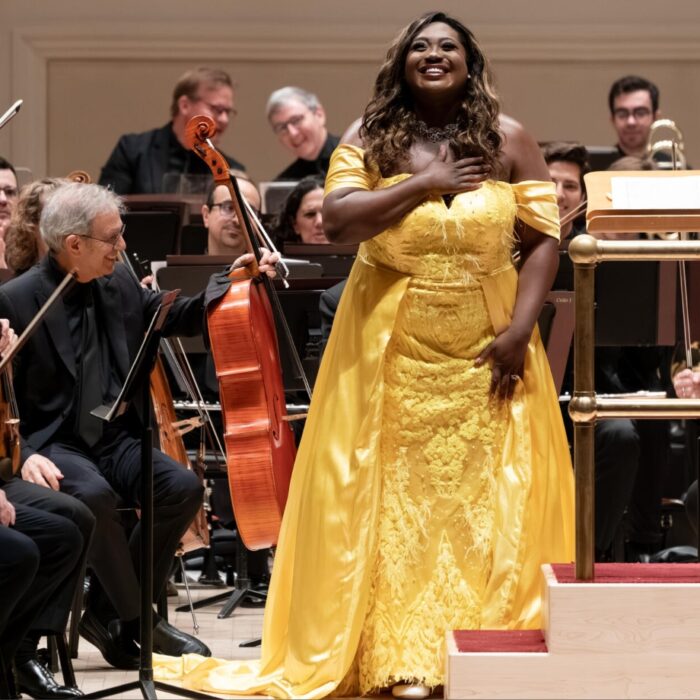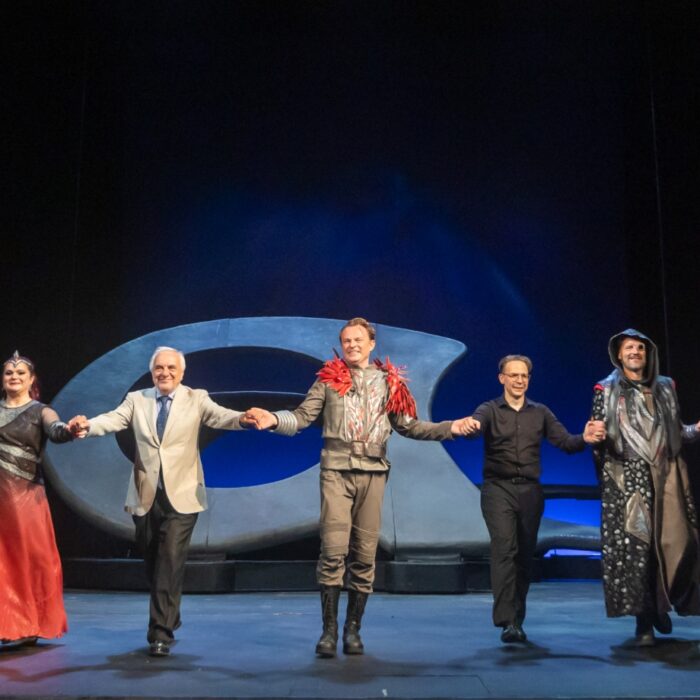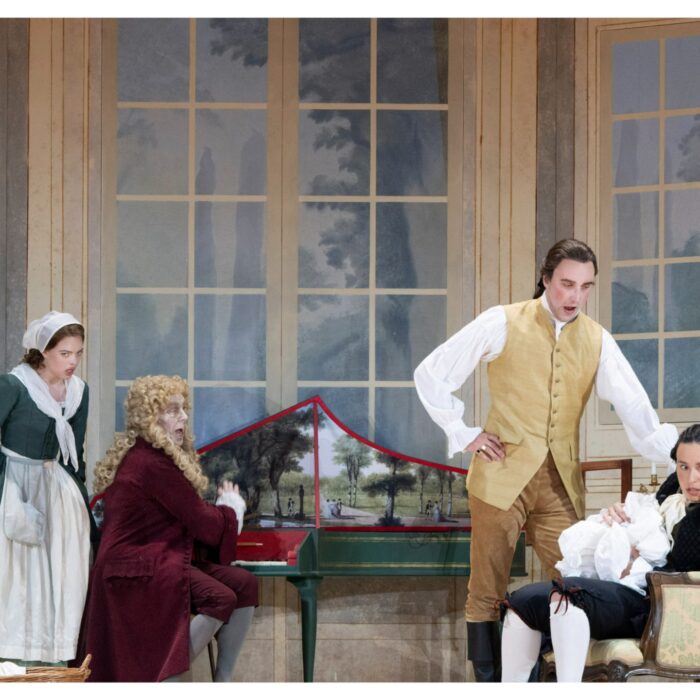
Royal Opera House 2018-19 Review: La Fille du Régiment
An Ebullient, Fanciful Layer Cake Abound in Vocal Splendor By Javier Camarena & Sabine Devieihle
By Sophia Lambton(Photo: Royal Opera House/Tristram Kenton)
A map unfolds to become mammoth-sized over the stage in Laurent Pelly’s 2007 production of “La Fille du Régiment:” a zany and cartoonish exposition of this far-fetched comic tale that stretches paper-thin our talent for suspending disbelief. Mounting the set in an unspecified era with almost incidental visual references to furniture, furnishings and fashions of the work’s Napoleonic period, Pelly lays bare the opera’s luminous comedic gems, occasionally straddling the border between cuteness and pantomime camp.
Set designs mostly resist branching out into the straits of superfluousness; the color palette of contrasting missing walls in a royal purple backdrop with the rich mahogany of slanting furniture in the Marquise’s castle is equal parts aesthetically enticing as it is absurd. The production’s by-now infamous image of heroine Marie, the regiment’s canteen girl, in the process of ironing an unending washing line of the troops’ oversized underpants is just one of the spectacle’s aspects that poke innocent fun at the plot and the characters’ incredibility. Marie’s purportedly militant garb – the ensemble of a white vest, blue trousers and suspenders – makes light of her attempts to fancy herself “one of them” whilst also highlighting her tomboy nature by accompanying this with her ungainly trundling and galumphing.
Though select comically broader moments approach too closely the frontier between good taste and quick ‘n’ easy ways to rouse laughs – such as Marie repeatedly popping out of her regiment’s manmade Jack-in-the-Box to lap up spectators’ applause – their style is saved by this cast’s buoyant urge to honor fine comedic timing and ignite the piece with blazing spirit.
Daughter of the Regiment
Sabine Devieilhe’s Marie is mobilized with well-apportioned manifestations of grit, pluck, camaraderie and irreverence towards her blood family; her muffled, inaudible rants to herself as she begrudgingly busies herself with her tasks is a bounteous display of immaturity and the reckless, unwieldy ambition of youth. Devieilhe’s silvery coloratura soprano is an agile and twistable instrument easily molded to craft the protagonist’s mock-shock diminuendi and limber, staccato-glazed sprightliness.
Certain chromatic scales slide down without integral fluency nonetheless, omitting select notes and racing hard-pressed to the finish. With an occasionally skimpy higher register, Devieilhe would do well to support more of the top part with extra vibrato and diaphragmatic support, and not allow loose breath to make words such as “mes camarades” (“my comrades”) in the renowned aria “Il faut partir” too affected and melodramatic. Most of the time the soprano’s legato remains intact over challenging vocal passages – but in this aria a harder note comes close to cracking at the apex of her range. While her embodiment of the humorous heroine unleashes many a laugh, Devieilhe struggles in the midst of this madcap production to shift into the vulnerable recess of her character, diminishing her verity in the opera’s rare tender moments.
Mischievous Rapscallion
An adventurous and boisterous match for Devieilhe’s rapt, scampering antics, Javier Camarena’s Tonio is as much a mischievous rapscallion as his beloved. Excitement haphazardly spurs him to rush certain quicker sections and his beginning of “Ah, mes amis quel jour de fête” quivers slightly in its nervousness. Having prepared the aria with manifest confidence and aplomb Camarena nevertheless sustains the cavernous force of his extremely well supported tenor throughout the arduous climb of the piece, exploiting a gamut of alternations between thick and thin vibrato and abrupt and gradual diminuendi in this steep ascent of a laborious aria. Amply painted with the zealous ardor of a fledgling’s love, his bold self-proclamation as a soldier and a budding husband – “Me voici militaire et mari” – is palpably smattered in the effrontery of his daring affection for the regiment’s “daughter.”
Every expulsion of Camarena’s pristinely clean high ‘C’s emerges gallant and aglow, chaining its listeners in fetters of goosepimples. The exhilaration of the roar of the crowd in this instance unleashed an encore, prompting the tenor to mistakenly break character and shrug to the audience before beginning again: an action which cracked the spell somewhat. Nevertheless the voltage of his fervid realization of the character steered unremittingly full steam ahead throughout the second act – even if certain notes like “en tremblant” and “de vivre” in “Tout en tremblant, je viens, madame” (“I come, Madame, all atremble”) suffer a tad from instability. Although there is no question of Camarena’s vocal preparation and the enviable relish he takes in his roles, resisting the temptation to get carried away in some moments would heighten his hefty accomplishment.
Soldier & Marquise
Enkelejda Shkoza’s Marquise de Berkenfield makes learned use of vibrato to lend her pompous, capricious, entitled personage her necessary age. The ridges of her warm, brassy mezzo-soprano ensure the Marquise is humorous without too broad a brush, retaining the style of both her social standing and stature. Occasionally chromatic scales lose evenness in their ascent in a trio that cites the respect of beauty, mores and innocence (“la beauté, les mœurs, l’innocence”) in her aria “Pour une femme de mon nom (“For a woman of my name”).” Yet such facets as the glee in her quivering voice as she speaks, “Un château du même nom que moi!” (“A castle with the same name as I!”) render her almost endearing.
Bombasticity rightly pervades Pietro Spagnoli’s imprint on Sergeant Sulpice, the main “papa” of Marie’s four dozen or so doting fathers. Offering his brazen top notes with a consistently steady panache, the baritone allows our ears to glean expressions alternating between pugnacity, a proud father’s effusions and the persnickety snobbery that informs his dismissal of Tonio: Marie’s love and an enemy soldier. His reception of the Marquise’s Act Two confession that she is in fact Marie’s mother makes for cantankerous back-and-forth rounds of shenanigans between the two characters.
Treating the score with a varnish that best highlights its eccentric, unprecedented stirrings of jovial strings or belligerent brass, Evelino Pidò loosens from the ensemble jangling-like, mischievous trills on violins and luscious, incremental bouts of warmth over the swell of tremolos. While there is very occasional inconsistency in the texture of brass, entrances of woodwind are always on point and often comedically rhythmic.
With a great deal of the text transplanted into more modern French jargon in an adaptation by Agathe Mélinand, some of it a little risqué (“conne” does not, as the surtitles profess, translate as “old bat;” neither is “merde” “bloody hell”) this fantastical, almost parodical production of “La Fille du Régiment” serves Donizetti’s satirical score with a much-needed absence of grandeur.
It’s a caliber of musical escapism an audience might wrongly think is incompatible with comedy – and a delightful route to being proven wrong.



